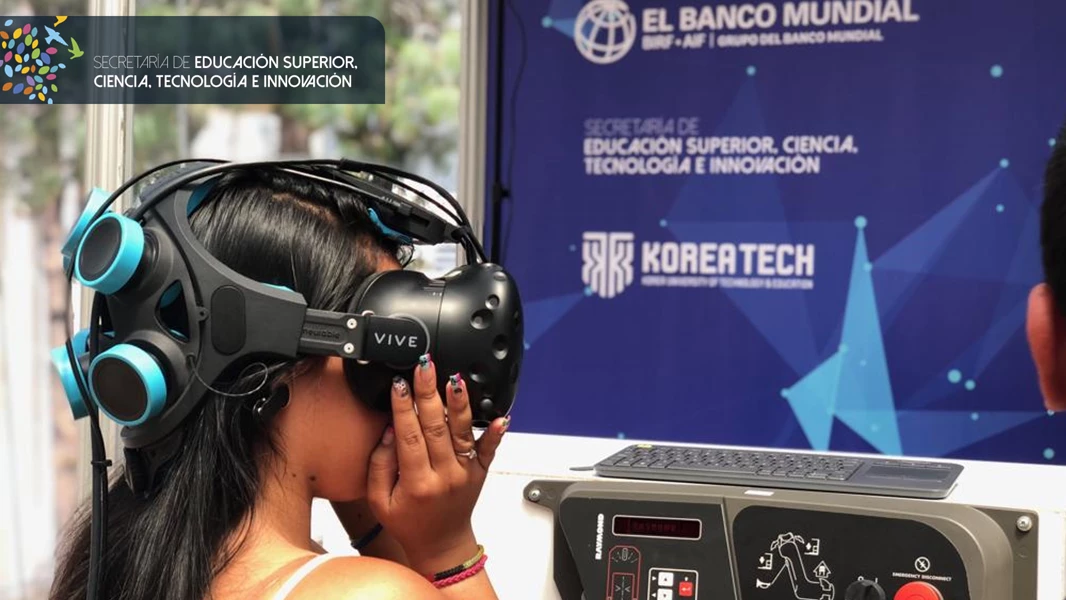
A few years ago, it would have been unlikely for a young Latin American student from a disadvantaged background to be able to access high-quality technical training using state-of-the-art technology and laboratories.
Implementing training programs in technical and vocational education, especially in vulnerable areas, has traditionally been a difficult and expensive task. Rapid technological progress often requires that training centers continually make investments to adapt their content, teaching materials, technology, and laboratories.
Partly due to the high cost of equipment and laboratories, technical programs in the region have traditionally prepared students to respond to the needs of the service sector (e.g., accounting, tourism, computer science). Less emphasis has been placed on manufacturing, agroindustry, and technology. Moreover, most approaches to technical training in Latin America offer only limited "practical" or “on-the-job” training and focus instead on in-class teaching.
But that is changing. Today's technology is helping to overcome those barriers. New models of immersive teaching that use augmented reality (AR) and virtual reality (VR) technologies, have shown that it is possible to develop the technical and practical skills of students without making large capital investments.
Immersive training is an innovative approach being used as a teaching methodology, which can provide a similar to real-life environment and simulate state-of-the art technology and equipment, without the need to make large capital investments. Immersive training is essentially a simulation that uses computer graphics to form actual situations.
The Potential of Immersive Training
Although more experimental research is needed, the consensus in the literature is that immersive training, if well designed, can positively support learning and help develop practical skills. An experimental study conducted recently in China found that students exposed to immersive learning showed, on average, better results in learning assessments. These results were up to 30% higher than among students exposed to traditional training. Other studies indicate that immersive training can effectively build practical skills for surgeons, welders, machine operators, security officers, and pilots. Moreover, several studies have found that immersive training enhances the motivation of teachers and students, which leads to better learning.
Within this context, the Government of Ecuador recently introduced the ActiVaR program through its Secretariat of Higher Education, Science, Technology, and Innovation (Senescyt), and within the World Bank financed, “ Transformation of Tertiary Technical Institutes Proyect”. ActiVaR is an immersive training program that will use VR technology to develop the practical skills of between 500 and 700 students enrolled in public technical and technological training centers. Students will be able to benefit from this immersive training starting in May, 2020.
The ActiVaR program was launched in Quito on October 23, 2018 by the Secretary General of the Presidency of the Republic, the Secretary of the Senescyt, and the President of the Chamber of Industries and Production. A number of rectors, teachers, and students from the national network of public technical and technological training centers participated in the launch.
Training centers participating in the program will benefit from technical assistance to design, implement, and evaluate an immersive training curriculum in a technical field using VR technology. The program will equip training centers with a VR laboratory and will train teachers to properly use the technology.
The ActiVaR program will be implemented in close collaboration with the University of Technology and Education of Korea (KOREATECH), an institution pioneering the worldwide use and development of immersive training programs. This pilot program will be financed by the Korea-World Bank Partnership Facility, with technical assistance from the World Bank.
The ActiVaR pilot program will be amongst the first of its kind in Latin America. The results of the program will serve to inform policy makers about the benefits, scalability, and potential of using immersive technology in the region. ActiVaR: activating the future of technical and technological training in Ecuador.
Evento Realidad Virtual: innovando la formación técnica y tecnológica


Join the Conversation